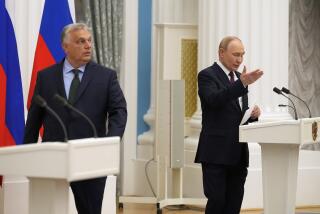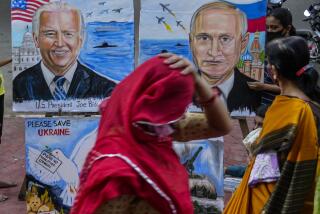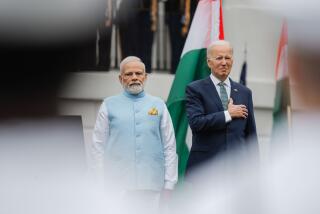Kremlin Chief Visiting India : Gandhi Strongly Supports Gorbachev on Arms Curbs
- Share via
NEW DELHI — Prime Minister Rajiv Gandhi on Tuesday hailed Soviet leader Mikhail S. Gorbachev as a “crusader for peace” when the Kremlin chief arrived for a four-day state visit.
Gandhi echoed Gorbachev’s attacks on President Reagan’s plans for a space-based missile defense and said they wrecked chances for a disarmament breakthrough at last month’s superpower summit meeting in Reykjavik, Iceland.
It was the strongest endorsement to date of Gorbachev’s arms control proposals by Gandhi, who prides himself on his leadership of the nonaligned movement.
Gorbachev Blames Militarism
Gorbachev, making his first visit to an Asian nation since taking power 20 months ago, said that “the chains of militarism” are blocking progress toward a U.S.-Soviet arms accord.
“The arms race devours the resources that are so badly needed to solve the burning problems affecting the lives of hundreds of millions of people,” Gorbachev said.
Gorbachev, surrounded by the tightest security ever seen in the Indian capital, received a 21-gun salute and other honors usually reserved for a head of state.
Tens of thousands of spectators, including children who were let out of school for the occasion, tried to get a glimpse of Gorbachev as he and his wife, Raisa, raced by in a bulletproof Zil limousine flown from Moscow.
Modest-Size Crowd
But it was a modest crowd by New Delhi’s standards despite the efforts of Gandhi’s Congress-I party to dramatize backing for the Soviet leader by bringing busloads of people from outlying areas.
“Rajiv Gandhi told us to come,” said Shanti Ujainwal, 30, a woman from a suburban area across the Jamuna River from New Delhi. She said a bus driver arrived in her neighborhood shouting, “A big minister is coming,” and urging residents to get on the bus.
However, policemen blocked attempts by scores of refugees from Afghanistan to protest the presence of Soviet troops in their country by seizing their placards and banners and putting their leaders under house arrest.
Mohammed Maiwand, an Afghan refugee leader, said he had been told by Indian officials that they did not want any demonstrations that would “embarrass the guests” from Moscow. Police officers broke up a demonstration by 200 Afghans in Lajpat Nagar, an area far removed from the main ceremonies. A police official said 57 Afghans were arrested.
The welcoming ceremony, which included sari-clad women showering rose petals in Gorbachev’s path down a long red carpet, went off without a hitch.
Russian Welcome Signs
Along the way, the Soviet leader saw welcoming signs in Russian, two large imitation elephants covered with marigolds and dozens of soldiers from the Camel Regiment border security force.
Raisa Gorbachev, who is adding new visibility to the role of Kremlin first lady, got equal space along with her husband and Gandhi on hundreds of placards posted along the route.
In contrast, Gandhi’s Italian wife, Sonia, remained in the background, although she appeared at the airport to greet the visitors and later was hostess at a tea for Mrs. Gorbachev and several Indian female intellectuals and artists.
There were weeks of intensive preparations before Gorbachev’s arrival, partly because of concern over security in the capital, where Prime Minister Indira Gandhi, the current prime minister’s mother, was assassinated by two of her own bodyguards in 1984.
At times, the Soviet leader was barely visible behind a wall of tall, heavy-set agents sent from Moscow. He was housed in Rashtrapati Bhavan, the president’s palace, where he and his party took over an entire wing of the red sandstone building that once housed the British viceroys.
340-Room Palace
The palace--with 340 rooms and almost 2,000 servants--has 330 acres of grounds and sits on a high bluff dominating the city.
Gandhi welcomed Gorbachev “not only as a world statesman but as a friend” as the two men opened talks on Indo-Soviet relations and world problems.
“Under your leadership, the last 20 months have witnessed a most impressive contribution to the peace process,” the 42-year-old prime minister told his guest at a banquet.
“At the recent summit in Reykjavik, you made constructive and bold proposals . . . “ Gandhi added.
“It was unfortunate that the Strategic Defense Initiative blocked agreement,” he said, referring to Reagan’s missile defense plan, popularly known as “Star Wars.”
The summit meeting broke down over Reagan’s refusal to accept the Soviet demand that the “Star Wars” program not involve tests outside the laboratory.
“Never before had the prospects for peace looked so bright--a new beginning was so near and yet so far,” Gandhi said.
“The divergent perceptions at Reykjavik must not deflect the world from pursuing the proposals that were put forward at the summit,” he added. “We must persevere.”
Criticizes ‘Star Wars’
In renewing his criticism of Reagan’s “Star Wars” plan, Gandhi said:
“The logic of a shield in space is deeply flawed. The speed and complexity of systems of nuclear warfare eliminate human intervention. Disaster may never be willed. It might just happen one lazy afternoon.”
By contrast, Gorbachev’s remarks were low key and general. He said Moscow would give India priority in its foreign policy and expressed satisfaction that New Delhi’s role in world affairs is growing.
He and Gandhi were closeted only with interpreters for more than three hours in their first meeting. Gorbachev said in his banquet speech that they already had agreed on “important things” but gave no details.
A Trusted Friend
Gandhi termed the Soviet Union a tried and trusted friend in times of trouble and triumph.
“You respect our nonalignment; we respect your consistent commitment to peace,” the Indian leader said at the airport reception.
Indian newspapers and the government-run television have been flooded with special stories and programs on the Soviet Union. Many Indian firms that trade with the Soviets took out large ads to praise Gorbachev.
The Hindustan Times, however, said the publicity buildup was too much in view of India’s declared nonaligned posture between the superpowers.
“It would be a grievous mistake for India to convey the impression . . . that the nonaligned stalwart is bending backwards to show itself more aligned with one superpower against the other,” the paper said in an editorial. “Such unimaginative propaganda smacks almost of servility.”
More to Read
Sign up for Essential California
The most important California stories and recommendations in your inbox every morning.
You may occasionally receive promotional content from the Los Angeles Times.










